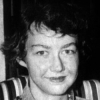Flannery O'Connor

Flannery O'Connor
Mary Flannery O'Connorwas an American writer and essayist. An important voice in American literature, she wrote two novels and 32 short stories, as well as a number of reviews and commentaries. She was a Southern writer who often wrote in a Southern Gothic style and relied heavily on regional settings and grotesque characters. Her writing also reflected her own Roman Catholic faith and frequently examined questions of morality and ethics. Her posthumously-compiled Complete Stories won the 1972 U.S. National Book...
NationalityAmerican
ProfessionNovelist
Date of Birth25 March 1925
CitySavannah, GA
CountryUnited States of America
I feel that discussing story-writing in terms of plot, character, and theme is like trying to describe the expression on a face by saying where the eyes, nose, and mouth are.
The novelist is required to open his eyes on the world around him and look. If what he sees is not highly edifying, he is still required to look. Then he is required to reproduce, with words, what he sees.
Our age not only does not have a very sharp eye for the almost imperceptible intrusions of grace, it no longer has much feeling for the nature of the violences which precede and follow them.
I can, with one eye squinted, take it all as a blessing.
When she told a story, she rolled her eyes and waved her head and was very dramatic.
I have enough energy to write with and as that is all I have any business doing anyhow, I can with one eye squinted take it all as a blessing.
The two worst sins of bad taste in fiction are pornography and sentimentality. One is too much sex and the other too much sentiment.
Go warn the children of God of the terrible speed of mercy,
Even in the life of a Christian, faith rises and falls like the tides of an invisible sea. It's there, even when he can't see it or feel it, if he wants it to be there. You realize, I think, that it is more valuable, more mysterious, altogether more immense than anything you can learn or decide upon It will keep you free - not free to do anything you please, but free to be formed by something larger than your own intellect or the intellects around you.
It is popular to believe that in order to see clearly one must believe nothing. This may work well enough if you are observing cells under a microscope. It will not work if you are writing fiction. For the fiction writer, to believe nothing is to see nothing.
There is a question whether faith can or is supposed to be emotionally satisfying. I must say that the thought of everyone lolling about in an emotionally satisfying faith is repugnant to me. I believe that we are ultimately directed Godward but that this journey is often impeded by emotion
Either practice restraint or be prepared for crowding
There won't be any biographies of me because, for only one reason, lives spent between the house and the chicken yard do not make exciting copy.
Nobody with a good car needs to be justified.